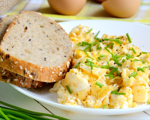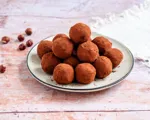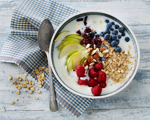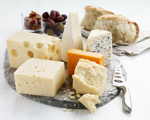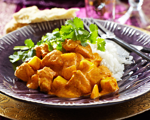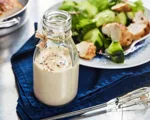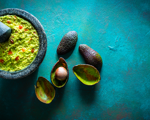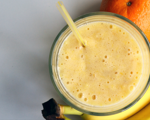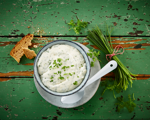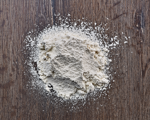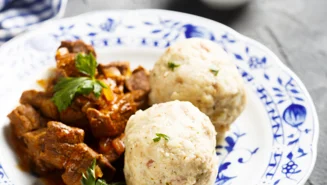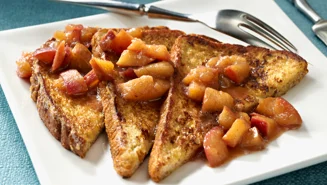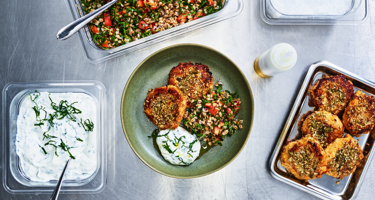
While many thoughts on protein tend to centre mostly on animal protein, such as meat and fish, there is a whole world of plant-based protein to discover as well, encompassing lots of great protein-rich foods for vegetarians to use in their daily cooking.
Continue reading to learn more about the abundance of protein sources for vegetarians to discover new favourites to experiment with in the kitchen.
Plant-based protein sources for vegetarians
In the following sections, we list some of the most popular plant-based protein sources within the categories of vegetables, legumes, soy products, nuts and seeds, grains, and dairy products. The lists are only a selection, so there are many more options to choose from. We state the protein content in grams per 100 grams and the percentage of the total energy value.
Vegetables
Vegetables are a natural part of many diets, especially vegetarian ones, so it is, of course, relevant to look at the protein content of vegetables.
| Source | Protein content (per 100 grams) | Percentage of the total energy value |
|---|---|---|
| Kale | 4.7 | 31.7 % |
| Brussels sprouts | 4.5 | 34.3 % |
| Sweetcorn on the cob | 3.7 | 16.5 % |
| Broccoli | 3.6 | 41.4 % |
| Rocket | 3.3 | 63 % |
| Spinach | 2.6 | 43.3 % |
Check our Top 15 high-protein vegetables for more information and a longer list of vegetables with a high protein content.
Legumes
Legumes are a popular high-protein food group. Beans, lentils, peas, and chickpeas are excellent sources of protein and are often considered a staple in vegetarian diets.
| Source | Protein content (per 100 grams) | Percentage of the total energy value |
|---|---|---|
| Chickpeas, canned | 6.2 | 22.2 % |
| Green peas | 5.9 | 34.1 % |
| Green lentils, dried | 20.5 | 26.9 % |
| Red lentils, dried | 22.5 | 28.3 % |
| Mung beans | 23.9 | 29.7 % |
| Black beans | 6.6 | 25 % |
| Kidney beans | 6.1 | 26.3 % |
Legumes are easy to feature as the main protein in dishes for lunch and dinner. They can also be used to make delicious dips like hummus if you are craving a scrumptious snack.
Soy products
Soy products derive from soybeans. Soy protein is a complete protein, which is uncommon since most plant-based proteins are incomplete.
| Source | Protein content (per 100 grams) | Percentage of the total energy value |
|---|---|---|
| Edamame beans | 10.7 | 33.3 % |
| Tofu | 13.3 | 43 % |
Tofu and other soy products were most commonly used in Asian-inspired dishes in the past, but they now feature in all kinds of cuisines and can be used as a substitute for animal proteins in, for example, sandwiches, woks, salads, and BBQ goods.
Nuts and seeds
Nuts and seeds are worlds of their own with a broad range of options to choose from. They make for delicious additions to just about any meal throughout the day, where they can add additional flavour and textural contrast.
| Source | Protein content (per 100 grams) | Percentage of the total energy value |
|---|---|---|
| Almonds | 21.2 | 14.4 % |
| Pistachio nuts | 21.6 | 14.7 % |
| Peanuts | 25.8 | 17.8 % |
| Pumpkin seeds | 30.8 | 22.3 % |
| Sunflower seeds | 24.2 | 16 % |
| Chia seeds | 18.2 | 16.3 % |
| Poppy seeds | 18 | 13.5 % |
| Flax seeds | 25 | 22 % |
| Linseeds | 25 | 22.2 % |
Nuts and seeds can add a delightful crunch to anything from breakfast bowls and baked goods to salads and desserts. They can also be enjoyed as crunchy snacks on their own.

Grains
Grains are another category of protein sources for vegetarians. There are many to choose from, and they can be used in many different ways, ensuring great variation in your meals.
| Source | Protein content (per 100 grams) | Percentage of the total energy value |
|---|---|---|
| Oat | 13.3 | 14.7 % |
| Buckwheat, whole | 13.1 | 15.4 % |
| Pearled spelt | 11.1 | 13.6 % |
| Quinoa, black | 12 | 13.9 % |
| Quinoa, red | 12.8 | 14.4 % |
| Quinoa, white | 11.7 | 13 % |
You can eat oats for breakfast, use spelt to bake your own sandwich bread for lunch, and serve your dinner with buckwheat instead of ordinary rice. Quinoa has become a popular addition to many kitchens, so there are many ways to incorporate vegetarian protein sources into your cooking.
Dairy products
While many vegetarian sources of protein are, of course, plant-based, there are also animal-based ones that can be included in a vegetarian diet. These are, among other things, yoghurt, milk, and cheese.
| Source | Protein content (per 100 grams) | Percentage of the total energy value |
|---|---|---|
| Whole milk | 3.4 | 21.8 % |
| Semi-skimmed milk | 3.4 | 29 % |
| Skimmed milk | 3.5 | 40.5 % |
| Goat milk | 3.6 | 21.2 % |
| Yoghurt 3.5 %, plain | 3.8 | 27 % |
| Yoghurt 1.5 %, plain | 4.1 | 33 % |
| Greek yoghurt 2 % | 9.2 | 52.3 % |
| Greek yoghurt 10 % | 5 | 17.5 % |
| Skyr | 11 | 62.3 % |
| Cheddar | 25.8 | 26.5 % |
| Feta | 18.1 | 28.7 % |
| Goat cheese | 17.8 | 22.9 % |
| Mozzarella | 24.1 | 30.2 % |
| Parmesan | 33.6 | 38.4 % |
If you want to read more about the protein content of milk, cheese, and yoghurt, you can go to the following articles:
Ideas for vegetarian meals and snacks with high-protein foods
When talking about high-protein recipes for vegetarians it seems natural to start with the first meal of the day. Here, a breakfast bowl made with skyr or Greek yoghurt, chia seeds, and fresh berries can be an excellent choice. Eggs are also a good option – check our article about protein in eggs for more information.
For lunch and dinner, you can opt for an Asian-inspired stir fry with tofu and vegetables served with roasted sunflower seeds and buckwheat. Buckwheat can also make the base in a salad with cottage cheese, peanuts, and green peas. Bean-centric dishes like chilli sin carne with crème fraiche or refried beans with eggs, salsa, and fresh herbs can also be good vegetarian meals with protein.
For a quick but delicious vegetarian snack, you can opt for a handful of crunchy nuts or some buttery edamame beans with freshly squeezed lemon juice and a sprinkle of salt. A protein coffee is also a good option.
Remember that choosing high-protein foods, where at least 20 % of the total energy value comes from protein, or foods that are considered a source of protein, meaning that at least 12 % of the total energy value derives from protein, does not guarantee that the finished meal is also high in protein. The percentage is affected by whatever ingredients you choose to pair the protein sources with, so if you a looking for a certain amount of protein in a meal, you should consult an expert.
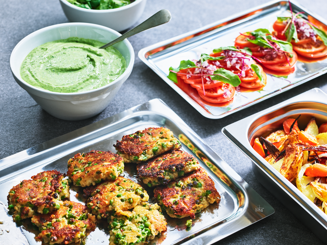
Which vegetarian foods are rich in protein?
There is an abundance of great high-protein vegetarian foods to choose from. For instance, legumes, encompassing, among others, beans and lentils, are classic staples known for their protein content.
Soy products such as tempeh and tofu are complete proteins that are very versatile in cooking. Nuts and seeds provide protein as well as texture and crunch. Dairy products also serve as excellent protein sources for vegetarians who include dairy in their diet.
All of these foods can be creatively used in various recipes to enhance the protein content of a vegetarian diet. Go to the relevant sections above if you want more detailed information about a specific category or food item.
Related Articles
Looking to boost your protein intake? Explore our comprehensive guides to protein-rich foods:



